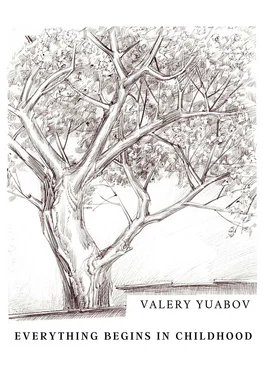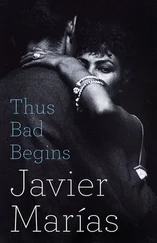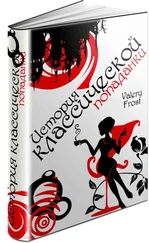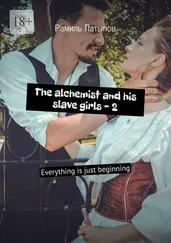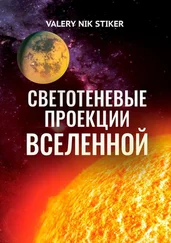Grandma always uttered this complaint through clenched teeth, hissing and winking, as if someone had inflicted a terrible pain on her and wouldn’t give her any relief. In other words, she was demonstrating how much she suffered.
Mama invited everybody to the table. After sitting down, Grandma immediately began to make herself the mistress of the repast, a repast that was somewhat strange because she acted as if Mama and us kids were not at the table. It was just her and her son Amnun, who was in her good graces that day.
“Amnun, what will you eat? Amnun, do you want some more? Amnun, what will you drink?” was heard at the table. Papa nodded sullenly. He was ill at ease.
The person who was always kind to Mama and us kids was Grandma Lisa’s brother Abram. He visited us often. He also came that day. I was glad to see him. Once Uncle Abram gave Yura and me a blue scooter. It was homemade, welded from rails. It was very heavy but safe. The point was not just his presents. I think children are finely attuned to other people’s attitudes toward them. They even sense their essence. And Uncle Abram wasn’t just kind and nice, he was the person all the relatives were proud of.
Stories about his “adventures” in combat were legendary. Perhaps they were made larger by added details as they were told and retold, but the main points were definitely true.
After he had been taken prisoner by the Germans near Lvov, he managed to pass himself off as an Uzbek, escaped a few times, was hidden by tenderhearted Ukrainian peasant women and then taken prisoner again. That’s how he knocked around for three years. When Soviet troops began their offensive, he was beaten almost to death after another escape but was liberated by one of the army units. Abram survived, recovered, returned to combat, reached Prague, was awarded many medals and orders, and returned home.
I don’t remember him wearing them to show off. Only once, while sitting on his lap, I managed to hold those round circles that were delightfully jingly and heavy.
After the horrible trials and tribulations of the war, Uncle Abram didn’t grow bitter. He didn’t break down but rather remained charming and bubbling with life, an amazingly kind man. The number of people he helped out – some with money, others with work – was great.
He could do that because he was very respected in town, even though he was just a taxi driver.
I heard from Mama that Uncle Abram always supported his sister Sonia, whose husband had been killed in combat. Sonia was a widow with three children, and they lived in poverty.
Every time someone spoke about Abram, Mama shrugged her shoulders, “I don’t understand who she takes after,” and she would look askance at Grandma Lisa’s house. Grandma Lisa was truly the complete opposite of her brother.
It began to grow dark. Jack whimpered softly in the yard – someone must be coming home. It was Grandpa returning from work.
“Here I am. Who is the birthday boy?” he said cheerfully setting his shoulder bag down.
He’d had a long day of work behind him, but Grandpa didn’t look tired. He had always been like that – encouraging, energetic. He didn’t like to use mass transit. Walking was his natural way of getting around. And he was quite fast, too. Not many people managed to keep up with him. “Hey, you!” he would reproach a walking companion who fell behind. And, clenching his fist, he would explain, “An empty sack cannot stand upright. You should eat well!”
After rummaging around in his shoulder bag, Grandpa took out a package.
“Va-le-e-e-ya!” he cheered, aping Yura. “Here’s some vanilla ice cream for you… Where are you, you prankster? And for you, I have sherbet…
The ice cream was dished out and we, smacking our lips, began to devour it. I was sitting across from Yura. We ate, looking at each other. And, without a word, we understood that we were friends again.
It was April 7 th, my birthday. It didn’t turn out too badly – I received a car, we had ice cream, but most importantly, Yura and I made up.
After all, we couldn’t live without each other.

Chapter 6. “Earthquake, earthquake!”

I woke up because my bed lunged under me. It lunged sharply as if it wanted to run away. Then it lunged again, not as sharply as before, and again, and again…
That was when I felt that everything around me was shaking and rocking.
Sleepy Emma was squealing in the dark. The floors were creaking, the dishes in the cupboard were clinking. The wall clock, long broken, began to tick-tock loudly, as the musical hammers suddenly started marking the time. The neighbors’ cows were mooing slowly and anxiously, hens were clucking. Jack alternated between howling and whining.
“Get up! It’s an earthquake!” Our parents threw blankets over me and my sister and took us running to the yard.
Grandpa and Grandma were already there.
“ Zamin, Zamin! ” Grandma Lisa shouted. She wore her nightgown and a scarf wrapped around her head. She was rubbing her lower back with her fist.
Grandpa, in his galoshes and drawers, which had slipped down to reveal his hairy stomach, threw up his hands in surprise. It seemed he was about to ask, “Where has it come from?” Grandpa had experienced many earthquakes throughout his life for they had happened in Tashkent before, but they had never been this bad.
Perhaps there were other relatives in the yard, but I don’t remember. I don’t even remember seeing Yura. I was too absorbed with what was going on around me.
In that pre-dawn hour, we, like primeval people, were alone against that natural phenomenon in our yard, on that small patch of land surrounded by the fence.
The earth continued to shake. Each vibration was echoed by a dull hum, similar to a remote clap of thunder.
It seemed that the outlines of the adobes in the yard leaned forward and jumped up like dancers on the dance floor, changing shape. The metal roof made strange sounds as if it had snapped and come apart at the seams.
Clinging to Mama, I bundled myself up in the blanket, covering my head so as not to see and hear it all. But the tremors seemed even scarier under the blanket, and it was stuffy in there.
I moved the blanket a bit and peered at the sky through a slit.
The vast expanses of sky ocean above my head were studded with blinking stars.
Dark against that background, the apricot tree with the outline of its spreading branches extended to the sky. It seemed to me that its top was planted firmly in the darkness of the firmament and held it up, swaying with each tremor. Maybe it was even telling the stars, “Don’t be afraid, I won’t let you fall down.”
An hour had passed since the earthquake began. The shaking grew weaker but could still be felt. The animals and birds were still anxious, and the shouting and crying of children could be heard from neighboring yards.
The day was breaking.
We could already see how our yards looked – the slanted chicken coop with its disheveled inhabitants, fragments of dishes on the table, pieces of the slate roof. Taught by bitter experience handed down from generation to generation, residents in our parts built their houses and even fences using saman . It was made of clay, cow dung and straw mixed with water. Adobes made of saman were much more pliant and less susceptible to destruction than bricks. But even houses made of saman could not withstand such a powerful earthquake.
Читать дальше
